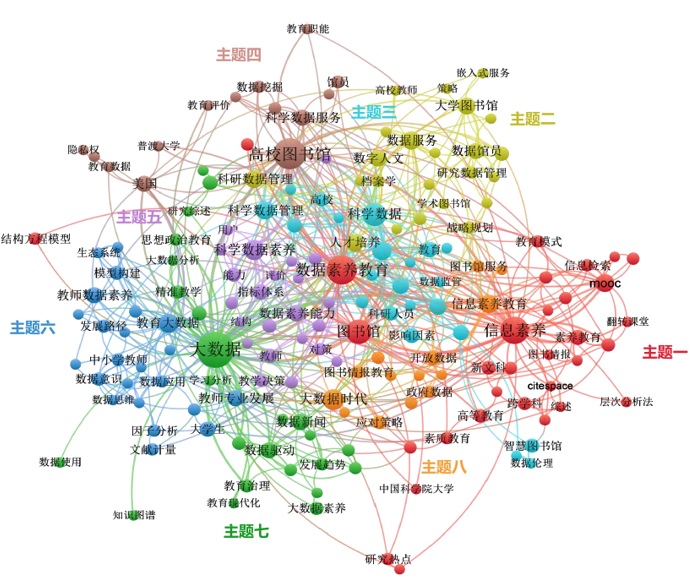 PDF(2267 KB)
PDF(2267 KB)


A Review of Data Literacy Research Based on Knowledge Map in China
Li Jiaojiao, Yang Zhihe
Knowledge Management Forum ›› 2022, Vol. 7 ›› Issue (2) : 153-163.
 PDF(2267 KB)
PDF(2267 KB)
 PDF(2267 KB)
PDF(2267 KB)
A Review of Data Literacy Research Based on Knowledge Map in China
[Purpose/Significance] In order to understand the current status of data literacy research in China, sort out the main topics and development trends of data literacy research. [Method/Process] Taking the co-word analysis method as the theoretical basis, based on cluster analysis method and strategic coordinate analysis method, this paper constructed the knowledge map of data literacy research topics and strategic coordinate map, and visualized them. [Result/Conclusion] It is found that the research on data literacy is in the exploratory period, and the research content is diversified, which is roughly divided into eight topics. Different research topics are interrelated and promote each other. The future research trend may leap forward to the research on library data literacy education and the research on data literacy of a new generation of librarians.

data literacy / knowledge map / co-word analysis / strategic coordinate analysis
| [1] |
STEPHENSON E, CARAVELLO P S.Incorporating data literacy into undergraduate information literacy programs in the social sciences: a pilot project[J].Reference services review,2007,35(4): 525-540.
|
| [2] |
黄如花,李白杨.数据素养教育:大数据时代信息素养教育的拓展[J].图书情报知识,2016(1):21-29.
|
| [3] |
孟祥保,钱鹏.高校社会科学数据管理的国际经验及其借鉴——以UKDA和ICPSR为例[J].情报资料工作,2013(2):77-80.
|
| [4] |
CALLON M, COURTIAL J P, TURNER W A, et al. From translations to problematic networks: an introduction to co-word analysis[J]. Social science information, 1983, 22(2): 191-235.
|
| [5] |
COBO M J, LÓPEZ-HERRERA A G, HERRERA-VIEDMA E, et al. An approach for detecting, quantifying, and visualizing the evolution of a research field: a practical application to the fuzzy sets theory field[J]. Journal of informetrics, 2011, 5(1): 146-166.
|
| [6] |
BAILEY K D. Numerical taxonomy and cluster analysis[J]. Typologies and taxonomies, 1994, 34: 35-65.
|
| [7] |
ECK N J V, WALTMAN L. How to normalize cooccurrence data? an analysis of some well‐known similarity measures[J]. Journal of the American society for information science and technology, 2009, 60(8): 1635-1651.
|
| [8] |
LAW J, BAUIN S, COURTIAL J P, et al. Policy and the mapping of scientific change: a co-word analysis of research into environmental acidification[J]. Scientometrics, 1988, 14(3-4): 251-264.
|
| [9] |
CALLON M, COURTIAL J P, LAVILLE F. Co-word analysis as a tool for describing the network of interactions between basic and technological research: the case of polymer chemsitry[J]. Scientometrics, 1991, 22(1): 155-205.
|
| [10] |
LEE B, JEONG Y I. Mapping Korea’s national R&D domain of robot technology by using the co-word analysis[J]. Scientometrics, 2008, 77(1): 3-19.
|
| [11] |
GIANNAKOS M, PAPAMITSIOU Z, MARKOPOULOS P, et al. Mapping child–computer interaction research through co-word analysis[J/OL]. International journal of child-computer interaction, 2020, 23: 100165 [2021-11-01]. https://www.sciencedirect.com/science/article/pii/S2212868920300015.
|
| [12] |
王康, 高继平, 潘云涛, 等. 多位态研究主题识别及其演化路径方法研究[J]. 图书情报工作, 2021, 65(11): 113-122.
|
| [13] |
雷春蓉,陈梦.国内外高校图书馆数据素养教育比较研究[J].图书馆,2021(4):47-51.
|
| [14] |
梁宇,郑易平.高校博士生数据素养的影响因素及应对策略[J].情报理论与实践,2021,44(4):146-152,137.
|
| [15] |
惠恭健,曾磊.智能时代的数据素养:模型构建、指标体系与培养路径——基于国内外模型的比较分析[J].远程教育杂志,2021,39(4):52-61.
|
| [16] |
顾立平,张潇月.开放科学环境下数据馆员的实践探析[J].图书情报知识,2020(2):60-74,112.
|
| [17] |
张璐,盛兴军.中外数据馆员培训实践调研与比较研究[J].新世纪图书馆,2020(2):31-35,47.
|
| [18] |
李梅.大学图书馆的研究数据服务创新与数据馆员新角色——英国爱丁堡大学范例研究[J].图书与情报,2019(3):122-130.
|
| [19] |
王宁,王震宇.大数据驱动下高校图书馆员数据技能分级培育模式研究[J].高校图书馆工作,2018,38(4):10-17,47.
|
| [20] |
陈媛媛,柯平.大学图书馆数据馆员职业技能发展研究[J].情报资料工作,2018(2):97-102.
|
| [21] |
许鑫,张月.数据时代图书馆员角色的转变——数据馆员的兴起[J].图书情报工作,2021,65(7):60-66.
|
| [22] |
李文文,周萍.基于科研生命周期的科学素养教育研究[J].现代情报,2017,37(1):156-159.
|
| [23] |
LASSWELL H D. The structure and function of communication in society[J]. The communication of ideas, 1948, 37(1): 136-139.
|
| [24] |
朱静.公共图书馆数据素养教育体系探析[J].高校图书馆工作,2020,40(5):80-84.
|
| [25] |
张长亮,王晨晓,李竟彤.大数据时代中美高校数据素养教育比较研究[J].情报理论与实践,2019,42(8):131-137.
|
| [26] |
潘雪,陈雅.我国高校数据素养教育评价指标体系探析[J].新世纪图书馆,2018(7):31-34.
|
| [27] |
吴爱芝,王盛.高校图书馆数据素养教育体系设计研究——以北京大学图书馆为例[J].大学图书馆学报,2020,38(6):96-103.
|
| [28] |
张文亮,刘敬仪.我国高校图书馆数据素养教育体系框架初探[J].高校图书馆工作,2017,37(4):80-84.
|
| [29] |
肖希明,倪萍.中美LIS教育中数据素养教育的调查与比较分析[J].图书与情报,2018(1):20-27.
|
| [30] |
李青,任一姝.国外教师数据素养教育研究与实践现状述评[J].电化教育研究,2016,37(5):120-128.
|
| [31] |
李青,任一姝.教师数据素养能力模型及发展策略研究[J].开放教育研究,2016,22(6):65-73.
|
| [32] |
李新,杨现民.中小学教师数据素养培训课程设计与实践研究[J].中国电化教育,2020(5):111-119,134.
|
| [33] |
林秀清,杨现民,李怡斐.中小学教师数据素养评价指标体系构建[J].中国远程教育,2020(2):49-56,75,77.
|
| [34] |
林秀清,杨现民,李新.中小学教师数据素养的发展路径与培养策略[J].现代教育技术,2020,30(1):59-65.
|
| [35] |
许亚锋,彭鲜,曹玥,等.人机协同视域下教师数智素养之内涵、功能与发展[J].远程教育杂志,2020,38(6):13-21.
|
| [36] |
司莉,姚瑞妃.图书情报专业研究生数据素养课程设置及特征分析——基于iSchool联盟院校的调查[J].图书与情报,2018(1):28-36,101.
|
| [37] |
周林兴,周丽,艾文华.大数据背景下图情档专业研究生数据素养教育探析[J].图书情报工作,2019,63(19):57-65.
|
李姣姣:进行数据处理与分析,撰写与修改论文
杨志和:撰写与修改论文
/
| 〈 |
|
〉 |